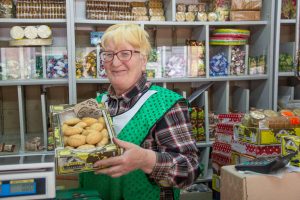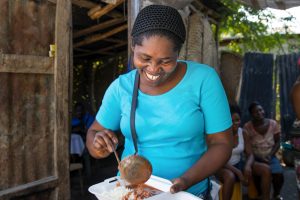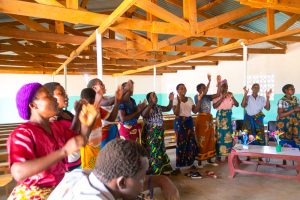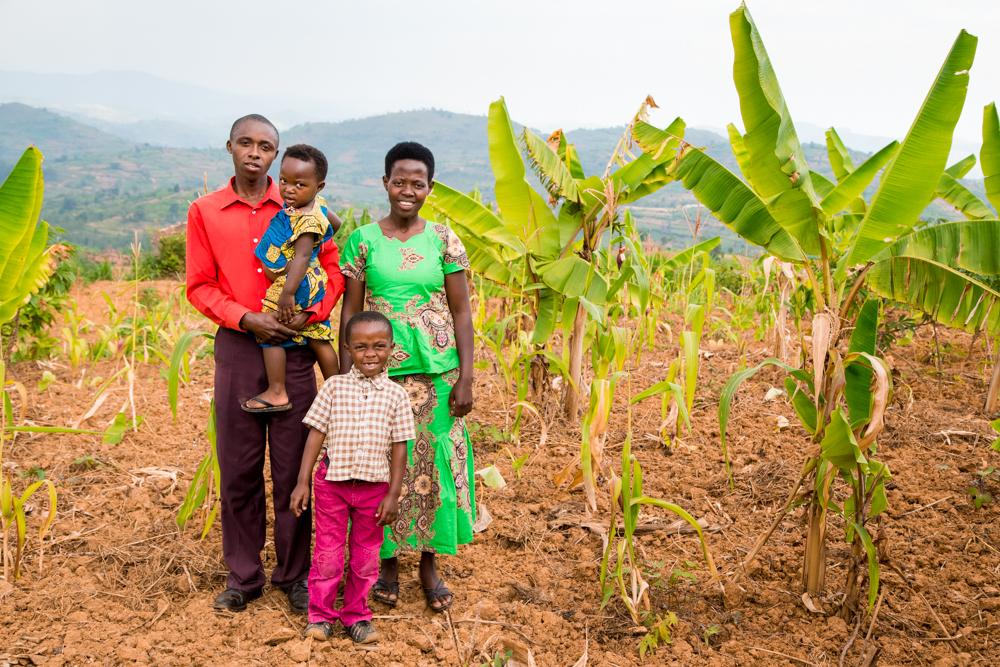Traditions abound at Christmas time. Though each family celebration is unique, we wanted to offer a glimpse into how those served by the HOPE network around the world may be joining together with family, friends, and neighbors to rejoice in Christ’s arrival. We marvel at the beauty of so many countries and cultures celebrating the gift of Jesus’ birth and invite you to pause and reflect on the meaning behind your own familiar traditions.
 Rwanda
Rwanda
Many will welcome Christmas Day with a late-night Christmas Eve service at their local church. Though the practice of exchanging gifts is common only among wealthier Rwandans, many Rwandan families (like Feresiya’s, pictured above) will be looking forward to a barbeque that may include fried potatoes, mashed cassava leaves, and green bananas simmered in tomato sauce. For many families, Christmas Day marks one of a few times a year when they will eat meat: likely grilled goat.
 Ukraine
Ukraine
Ukrainians celebrate Christmas on January 7. In many homes, a Christmas Eve feast known as Sviata Vechera, or Holy Supper, will be set. The dinner table may be laid with hay as a reminder of the Bethlehem manger where Jesus was born. Eating begins when the first star—symbolizing the journey of the Wise Men—is spotted in the eastern sky. Caroling is common in many communities, where young people or church members may go door to door collecting donations. Ukrainian children may eagerly await presents from Father Frost and his assistant, Snowflake Girl.
 Haiti
Haiti
Christmas Eve blends into Christmas Day for many families in Haiti, where a Midnight Mass or carol singing precedes reveillon, the main meal, begun in the early hours of Christmas morning and lasting until dawn. Neighbors open their houses late into the night and early morning, and children travel freely from one house to another with older ones looking after young ones. Children may clean their shoes, fill them with straw, and leave them on their porches in the hopes that Tonton Nwèl will exchange the straw for presents.
 Malawi
Malawi
In Malawi, carols may be sung on Christmas Eve in English or Chichewa. Christmas morning services include a Nativity play featuring local children. Festive music and dancing follows the service. While Malawians might typically eat nsima—a maize flour porridge—Christmas is often celebrated with chicken and rice. Some Malawian children may receive gifts from Father Christmas at school Christmas parties and enjoy mbatata (sweet potato cookies).
 Dominican Republic
Dominican Republic
Christmas can involve careful budgeting for families served by Esperanza International, HOPE’s partner in the Dominican Republic, who are self-employed and do not benefit from the Dominican practice of doble sueldo, when employers add an extra month’s pay in December as a Christmas bonus.
The Christmas season is very colorful and festive in Dominican Republic, with charamicos, handcrafted wooden Christmas trees painted in white or other bright colors: the Dominican answer to a snow-covered tree. Favorite Christmas foods include roast pork; banana leaves encasing pork, chicken, or fish; potato salad; and plantain casserole. Dominican children receive gifts not on Christmas but on Day of the Kings, January 5. Children place water and grass out for the Three Kings’ camels before going to bed, and when they awake their gifts have arrived!
Philippines
In the Philippines, you may hear Christmas carols as early as September, but celebrations begin in earnest nine days before Christmas, with Misa de Gallo (Mass of the Rooster) when the Christmas story is read from the Bible. The days leading up to Christmas are filled with firecrackers and parols (star lanterns). A Panunuluyan (asking for lodgings) pageant on Christmas Eve features “Joseph and Mary” knocking on doors, and the homes’ inhabitants joining them on their journey which ends at the local church, where they find shelter.
 Christmas Eve mass is followed by a midnight feast called Noche Buena (Holy Night). It’s a celebratory occasion filled with family, friends, and neighbors dropping in. Common foods include lechón (roasted pig), ham, fruit salad, steamed rice, rice cakes, and other sweets. Many children will leave puto seko, a crisp cookie, for Santa. Make your own with this recipe!
Christmas Eve mass is followed by a midnight feast called Noche Buena (Holy Night). It’s a celebratory occasion filled with family, friends, and neighbors dropping in. Common foods include lechón (roasted pig), ham, fruit salad, steamed rice, rice cakes, and other sweets. Many children will leave puto seko, a crisp cookie, for Santa. Make your own with this recipe!
Puto Seko recipe (courtesy of A World of Cookies for Santa):
Ingredients
- 1 cup butter
- 1 cup sugar
- 3 eggs
- 3 2/3 cups corn starch
- 1 teaspoon cream of tartar
- 1 teaspoon baking powder
Instructions
- Preheat oven to 375 degrees F (190 degrees C). Grease cookie sheets.
- In a medium bowl, cream together the butter and sugar until light and smooth.
- Beat in the eggs, one at a time.
- Add cornstarch, cream of tartar, and baking powder, stirring until well-blended.
- Roll dough into 1-inch balls and place them 1 inch apart on the prepared cookie sheets.
- Bake for 10 to 12 minutes in the preheated oven, or until light brown.
- Remove to wire racks to cool completely. Makes about 3 dozen cookies.
If your family would like to embrace another meaningful tradition this Christmas, consider giving in honor of one another through HOPE’s Gift Catalog, which features the opportunity to invest in the dreams of families around the world and share the hope of Christmas all year long.
Sources:
https://www.whychristmas.com/cultures/haiti.shtml
https://www.thekitchn.com/christmas-around-the-world-2-198159
http://www.worldofchristmas.net/christmas-world/ukraine.html
http://www.worldofchristmas.net/christmas-world/russia.html
https://www.thehamelsfoundation.org/happy-holidays-christmas-time-malawi/
https://www.whychristmas.com/cultures/philippines.shtml
http://getawaydominicanrepublic.com/it/10-interesting-facts-christmas-dominican-republic/
A World of Cookies for Santa by M.E. Furman
Christmas Around the World by Mary D. Lankford
















